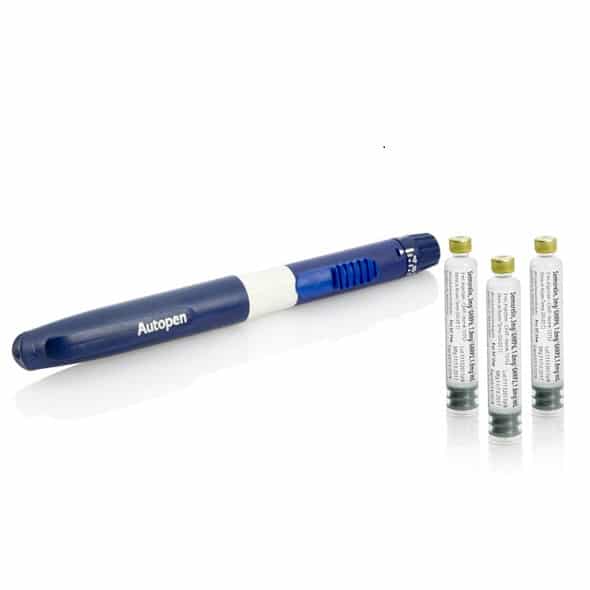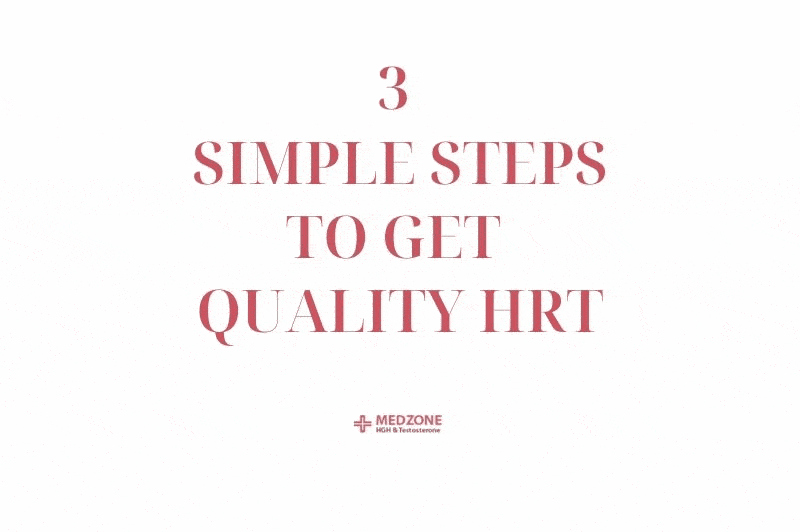
What is Metabolic Renewal? Comprehensive Review: Efficacy, Pros & Cons
Table of Contents
This is our comprehensive review of the Metabolic Renewal program for women, where we present all the evidence-based information patients should understand about its safety and efficacy complete with pros and cons.
What is Metabolic Renewal?
Here, we’ll take a critical lens to a proprietary program called Metabolic Renewal developed by a naturopathic physician named Dr. Jade Teta, featuring primarily a 12-week eating plan tailored to each individual patient’s hormonal profile and a workout plan.
The aim of the program is to increase metabolism as a strategy to lose weight.
Metabolism is commonly defined in medical literature as “the sum of the chemical reactions that take place within each cell of a living organism and that provide energy for vital processes and for synthesizing new organic material.”
In the context of diet, metabolism refers to the breakdown of calories taken in through food to be used to power the body’s various physiological functions.
Some people, due to genetic or lifestyle practices, have faster metabolism than others, which results in the quicker expenditure of energy and, as a result, less fat accumulation.
Hence, the goal of Metabolic Renewal is to boost the metabolic rate and drive weight loss. Here, we’ll explore the theoretical mechanics behind Metabolic Renewal and, most importantly, whether it delivers results for weight loss patients.
Pros and cons
The pros of Metabolic Renewal are:
- It’s easy to incorporate into your daily schedule and simple to follow
- It might promote short-term weight loss
- It’s a flexible program with multiple eating options
The cons of Metabolic Renewal are:
- Only designed for 12 weeks with no long-term strategy
- There is no significant clinical evidence to prove it works
- It’s expensive whereas other long-term effective dietary protocols are available for less; some are even free online
How much does Metabolic Renewal cost?
Metabolic Renewal has a $97 price tag, both for the online version of the program and for the physical materials such as DVDs and other items shipped to your house.
However, there are additional charges for shipping and handling if you opt for the physical materials.
The program comes with a 90-day money-back guarantee.
Discounts are sometimes available via the website or through partner vendors.
Supplements and an audiobook are available as extras.
How does Metabolic Renewal theoretically work?
Let’s briefly explore the rationale behind the Metabolic Renewal program.
At the outset of the program, patients are administered a 12-question quiz pertaining to their unique hormonal profile. It only requires a few minutes to complete.
After the test, based on your answers, you will be classified into one of seven hormone profiles differentiated according to your relative estrogen and progesterone levels. The protocol is slightly different for each hormone profile.
From there, the program is centered around the “4 M” framework.
Per the pyramid design, the bottom rung – mindset – is actually most important. Movement is second-most important, and so on. The idea is to get each foundational element in line to ultimately positively moderate the top rung, metabolics.
Let’s take each pillar one at a time, in order of importance:
-
- Mindset. The key component of mindset is controlling stress, mediated by the “stress hormone” cortisol that can trigger weight gain and prevent weight loss even when you are practicing healthy dietary and exercise habits.
- Movement. Rather than prescribing intense exercise protocols like jogging or cycling, the program actually called for Non-Exercise Associated Thermogenesis (NEAT), which refers to everyday movement like walking.
- Meals. Meal plans/eating habits are where a lot of women get hung up in their weight loss endeavors. Studies show that overly restrictive diets often do not work in the long term, as they can trigger rebound binging and other undesirable habits. The reason to stabilize and optimize hormones first, before tackling the dietary component of weight loss, is that balanced hormones positively influence eating behaviors by preventing unhealthy cravings and urges.
- Metabolics. Lastly, metabolics (aka exercise) is important for the long-term stabilization of hormones. The previous three pillars of the program are designed to set up the body to enhance energy expenditure during exercise. Because over-exercising can be just as detrimental to hormone health as none at all, the Metabolic Renewal program calls for “smart workouts” lasting fifteen minutes each three times per week.
Does the evidence show that Metabolic Renewal really works?
Despite the slick marketing and glossy presentation, Metabolic Renewal, unfortunately, lacks the research backing to support its effectiveness for sustainable, long-term weight loss.
While some elements of the program – such as hormone optimization – are legitimate therapeutic targets, the specific approach utilized in the program is not proven to work.
Although we don’t recommend Metabolic Renewal – we have better weight loss strategies to offer patients that we’ll explore coming up – there are a few effective approaches to weight loss in terms of diet that the program gets right:
- It focuses on low-carb, unprocessed, whole foods.
- It emphasizes high protein intake to satiate cravings
- It’s a flexible program that allows wide latitude to accommodate patient preferences
The biggest downside, arguably, to the Metabolic Renewal program is that it is a short-term intervention, which has been shown to often fail over extended timeframes, as patients are seen to regain the weight they have lost when the program ends.
Research published in Medical Clinics of North America explains:
“Obesity interventions typically result in early rapid weight loss followed by a weight plateau and progressive regain… Treatment of obesity requires ongoing clinical attention and weight maintenance-specific counseling to support sustainable healthful behaviors and positive weight regulation.”
What this demonstrates is the need for long-term, permanent weight loss strategies rather than short-term programs like Metabolic Renewal.
Healthline, a reputable health site that analyzes diet programs, for instance, awarded the Metabolic Renewal a disappointing 2.8/5 stars.
On its Facebook page, Metabolic Renewal only has 2.5/5 stars based on feedback from about 170 people.
Here is a relatively honest review of the program from a woman who completed it, with some in-depth discussion of the pros and cons and the specific challenges she experienced while on the protocol:
There have been some concerns expressed by customers over charges for supplements that they didn’t order and similar issues. However, it’s worth noting that Natural Health Sherpa, Metabolic Renewal’s parent company, currently enjoys an A+ rating from the Better Business Bureau.
Our weight loss recommendations
So, since Metabolic Renewal isn’t the optimal weight loss solution, what does an effective weight loss strategy look like?
Here are a few of our research-backed, proven weight loss recommendations to not only shed excess body fat but to keep it off – all while simultaneously improving your overall mental and physical health:
Healthy diet
The first aspect of a weight loss diet concerns the macronutrient ratios – fats, proteins, and carbohydrates. Low-carb diets, which prevent and treat insulin resistance and other metabolic conditions associated with chronic overconsumption of carbohydrates (especially refined sugar), are shown to induce weight loss.
Low-carb eating also delivers numerous other health benefits, which is why we recommend them for everyone – not just weight loss patients.
Via The Open Access Journal For Life & Environment Research:
“Low-carbohydrate, high-fat (LCHF) and very low-carbohydrate ketogenic diets (VLCKD) are increasingly used for the management of a range of health conditions, including neurological disorders, obesity, diabetes, metabolic syndrome, and various cancers… They are also used widely in the general population for weight-loss and maintenance, with improved satiety and control of hunger frequently reported by those who adhere to these diets.”
More research has found that low-carb diets increase insulin sensitivity and enhance glucose metabolism, which is essential for weight loss.
Cutting out processed foods is also beneficial for weight loss, as well as for overall health. Clinical research has demonstrated clearly that “consumption of ultra-processed foods may be associated with increased risk of obesity as well as metabolic syndrome prevalence, increases in total and LDL cholesterol, and risk of hypertension.”
Practically, here are several excellent, nutrient-dense, low-carb, unprocessed food items to include in your daily meals:
- Avocado
- Fish and poultry
- Grass-fed red meat
- Organic vegetables with an emphasis on the cruciferous family (bok choy, broccoli, kale, spinach, cauliflower)
- Low-carb fruits like berries
- Fermented products like kimchi, sauerkraut, and kefir. Fermented food products are rich in beneficial bacteria that are demonstrated to improve metabolic health and spur weight loss.
The number one rule of thumb that you can use – arguably the simplest dietary adjustment – is to avoid grains. Remove wheat, rice, and other common grains from your diet.
Supplementation
Weight loss supplements may not be necessary in some cases, especially if you’ve cleaned up your diet. However, certain supplements are shown to provide an extra weight loss boost, in addition to potentially delivering other health benefits.
For this reason, you might want to consider supplementation with:
- Omega-3 fatty acids (usually sourced from high-quality fish oil)
- Berberine (a powerful herb that increases insulin sensitivity)
- Caffeine (which spurs fat breakdown)
- Green tea extract
Again, supplementation for weight loss is not always necessary or ideal. Discuss any supplements you are considering with your doctor to avoid negative interactions with prescription medications.
Regular exercise
While exercise alone isn’t sufficient to induce weight loss, it is a powerful added element of any weight loss program because it results in added calories burned and also optimizes hormones.
Multiple research studies have documented “favorable effects of exercise training on weight loss and body composition changes in adults with overweight or obesity.”
Furthermore, regular exercise prevents patients from regaining weight following weight loss.
Aerobic and anaerobic exercise programs are both beneficial for burning excess calories and balancing hormones. It’s best to combine both forms of exercise. Here are a few workout programs to consider:
- High-intensity interval training
- Weightlifting
- Swimming
- Cycling
- Jogging
- Yoga
Another important consideration is simply everyday movement you can easily incorporate into your daily routine. Take the stairs instead of the elevator. Park your car further from the entrance in the parking lot. Cycle to work if possible when the weather permits.
The Metabolic Renewal program is right in warning against over-exercise, a common mistake that many weight loss patients make. More is not always better, and this is particularly true of exercise for weight loss.
Stress management
Another thing that Metabolic Renewal gets right is the centrality of stress management techniques to any weight loss program.
As the University of Utah explains, uncontrolled stress negatively impacts the hormones, which in turn drives unwanted weight gain:
“Stress actually plays a large role in your waistline and how easily you can lose weight. For example, multiple studies show how stress and lack of sleep can lead to an increase in your cortisol levels (the stress hormone)… Higher cortisol levels can also cause people to build up fat around their bellies.”
Excellent stress reduction techniques to limit stress and learn to relax include:
- Journaling (writing down your feelings helps to process emotions)
- Counseling/psychotherapy
- Breathing techniques such as the Wim Hof Method
- Meditation
- Yoga
- Cold exposure
Hormone replacement therapy
Two of the most powerful forms of HRT for weight loss are HGH replacement therapy and testosterone replacement therapy (TRT).
Human growth hormone (HGH) is critical for a healthy metabolism. Growth hormone deficiency (GHD) is a common condition characterized by abnormally low HGH levels.
HRT with somatropin (synthetic HGH) helps patients achieve greater weight loss, as evidenced by clinical research:
“GH treatment caused a 1.6-fold increase in the fraction of body weight lost as fat and a greater loss of visceral fat area than placebo treatment… in obese subjects given a hypocaloric diet, GH accelerates body fat loss, exerts anabolic effects and improves GH secretion.”
HGH simultaneously promotes lean muscle development and protects lean muscle mass during calorie-restricted dieting.
Testosterone deficiency (often termed low T) is another common hormone imbalance. TRT with synthetic testosterone effectively reverses low T and promotes healthy weight loss. Via the Current Opinion in Endocrinology, Diabetes and Obesity:
“Long-term testosterone therapy in men with testosterone deficiency produces significant and sustained weight loss, marked reduction in waist circumference and BMI and improvement in body composition.”
Many patients experience the negative health effects of undiagnosed hormone deficiencies for years before receiving proper care. Hormone deficiencies are especially common in aging adults. Talk to your doctor to learn more.

Conclusion on metabolic renewal
Metabolic Renewal does not have the necessary clinical backing to support its use as a weight loss tool. However, it is correct in prioritizing hormone optimization as a powerful weight loss tool, in promoting healthy eating, and in its emphasis on stress management.
Successful, sustainable weight loss is a long-term project that can’t be addressed with a short-term intervention like Metabolic Renewal.
As research has shown, “weight loss is a continuous metabolic adaptation process progressing through many biochemical and physiological changes involving the role of hormones, enzyme functions, metabolite effectors, and bioenergetics.”
Metabolic Renewal FAQs
Here are a few frequently asked questions (FAQs) regarding Metabolic Renewal.
What can I eat on the Metabolic Renewal program?
Metabolic Renewal emphasizes whole foods that are unprocessed and low in carbohydrates.
How long is the Metabolic Renewal program?
Metabolic Renewal lasts 12 weeks (3 months).
What are the Metabolic Renewal types?
- Type 1: Mixed-Signal Hormone Type
- Type 2: Hormone Overdrive Metabolism
- Type 3: Hormone Shortfall Metabolism
- Type 4: Ovarian Burnout Metabolism
- Type 5: Metabolic Sputter Metabolism
- Type 6: Ovarian Fatigue Metabolism
- Type 7: Ovarian Shutdown Metabolism
How can I renew my metabolism?
True metabolic renewal often requires a holistic combination of clean eating, supplementation regular movement, stress management, and hormone replacement therapy.


